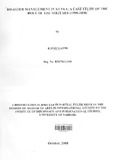| dc.description.abstract | Disasters, whether natural or man-made are the most destructive phenomena in human history. Notably, the two forms of disasters have been increasing globally in the recent past due to a myriad of factors such as environmental degradation, rapid unplanned urbanization, technological development, diseases and ethnic conflicts among others. However, even as disasters continue to destroy property, lives and livelihoods, their management in Kenya remains a big challenge and appears to lack the political goodwill. This is despite of the numerous UN recommendations towards DRR as a sine qua non measure to fight poverty and reverse the trend of losses caused by disasters whenever they occur. Here, disaster response has continued to be reactionary, ad hoc and uncoordinated. This is because the country lacks a clear national policy to regulate the various actors in disaster management. Due to inefficiency by the various civil authorities in disaster response, the military have often been called in to respond to emergencies as a last resort but with remarkable success.
This study has heavily relied on secondary data obtained through library research and enriched further with primary data that was gathered through use of open ended questioneers that were administered to seven key actors in disaster management who were purposively selected due to their expert knowledge on the area of study. The study finds that the absence of a national disaster management policy is largely responsible for poor coordination of disaster management in Kenya and strongly recommends that the same be completed expeditiously. Further, the study proposes creation of a National Disaster management authority that will merge the activities of the various government agencies that purport to deal with disaster management and regulate the NGO’s while recognizing the special role of the military and consider assigning them the lead role in response to certain types of disasters for effective, efficient and timely response. | en_US |



